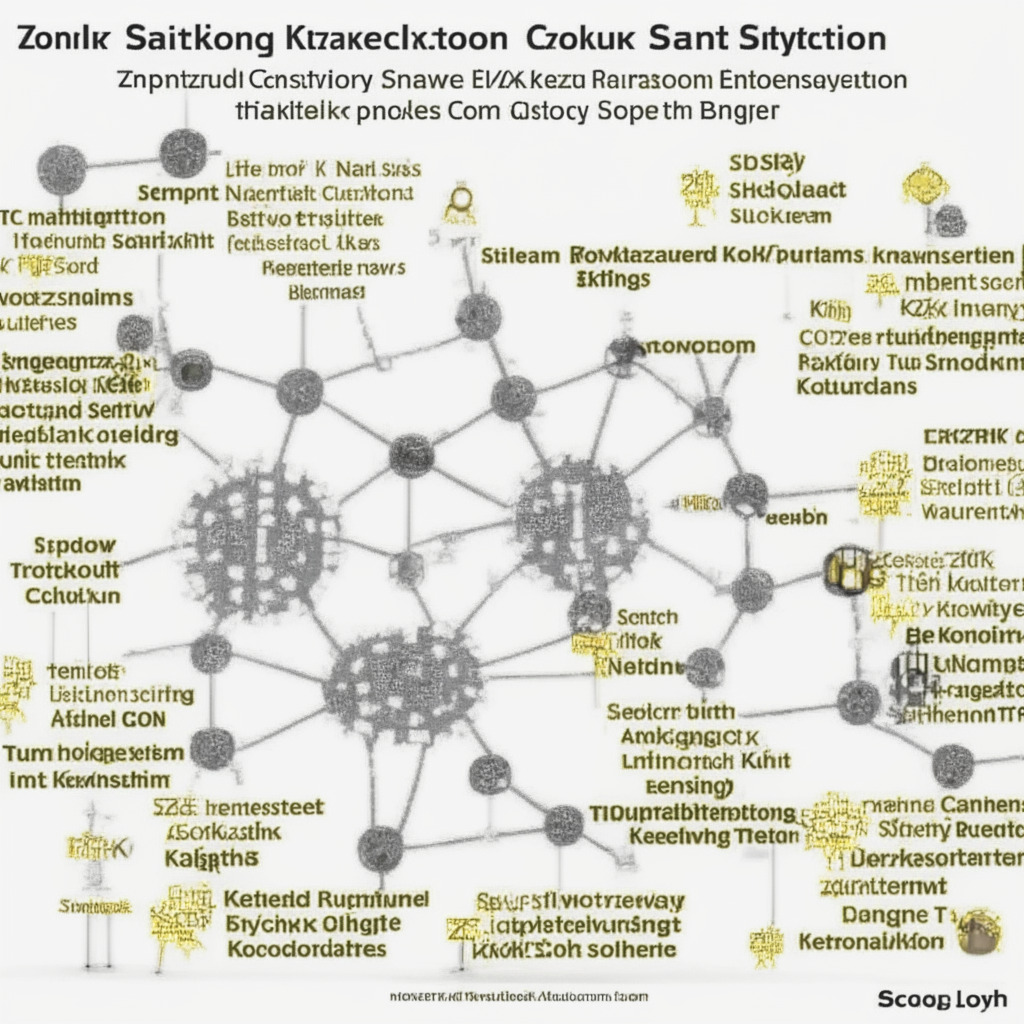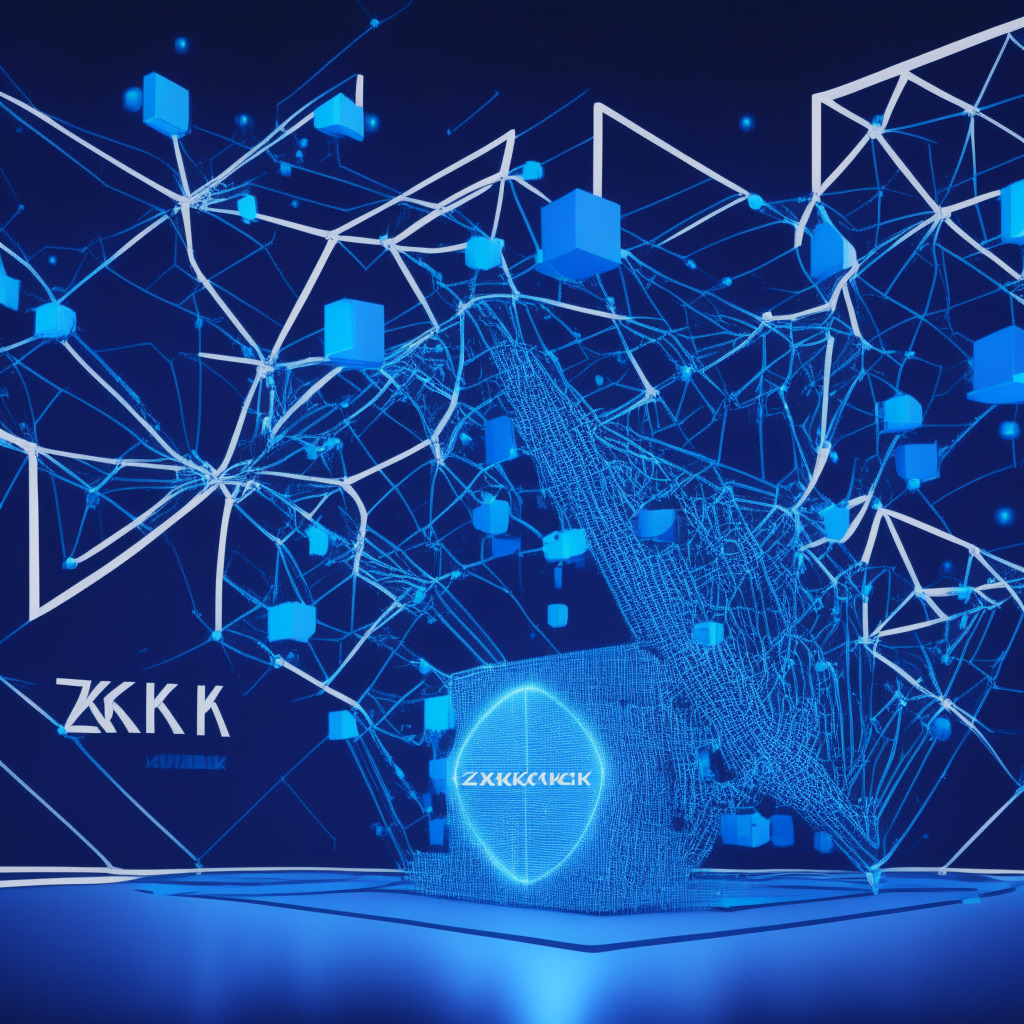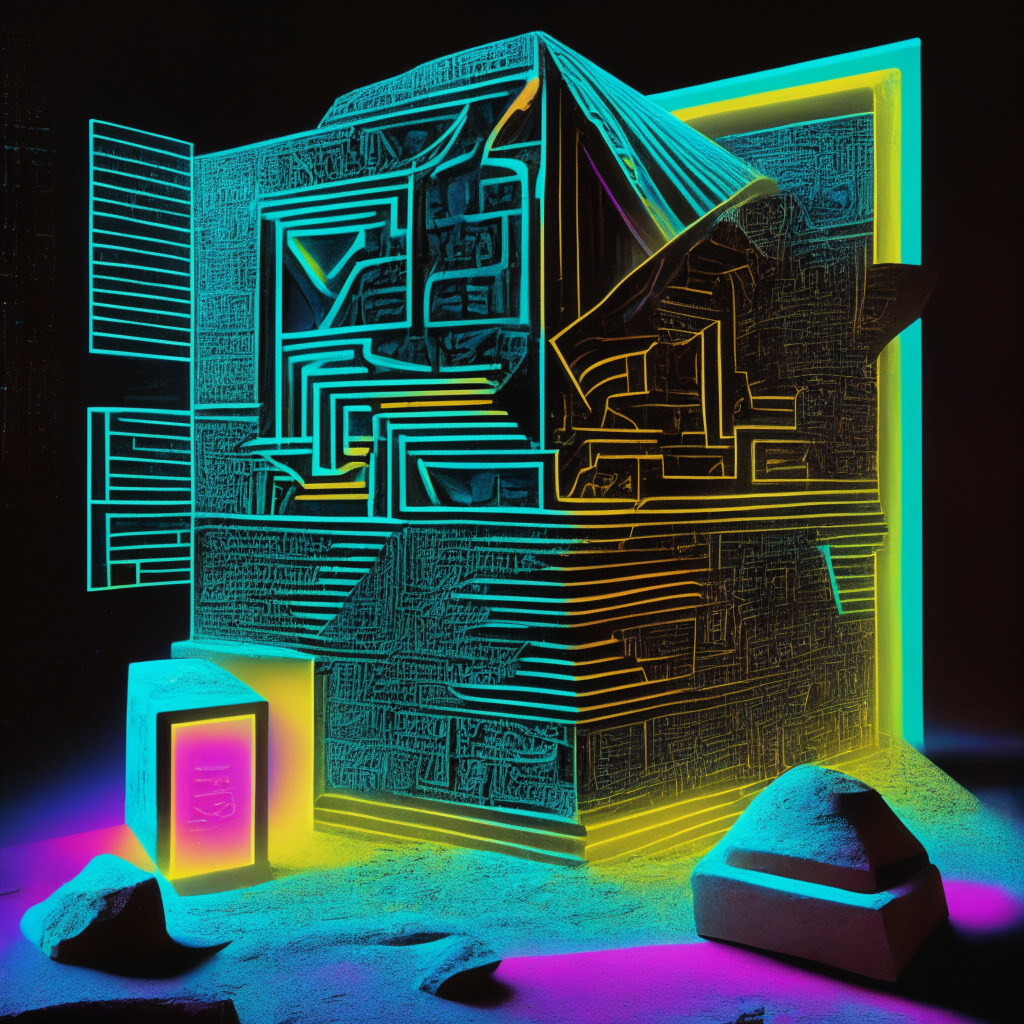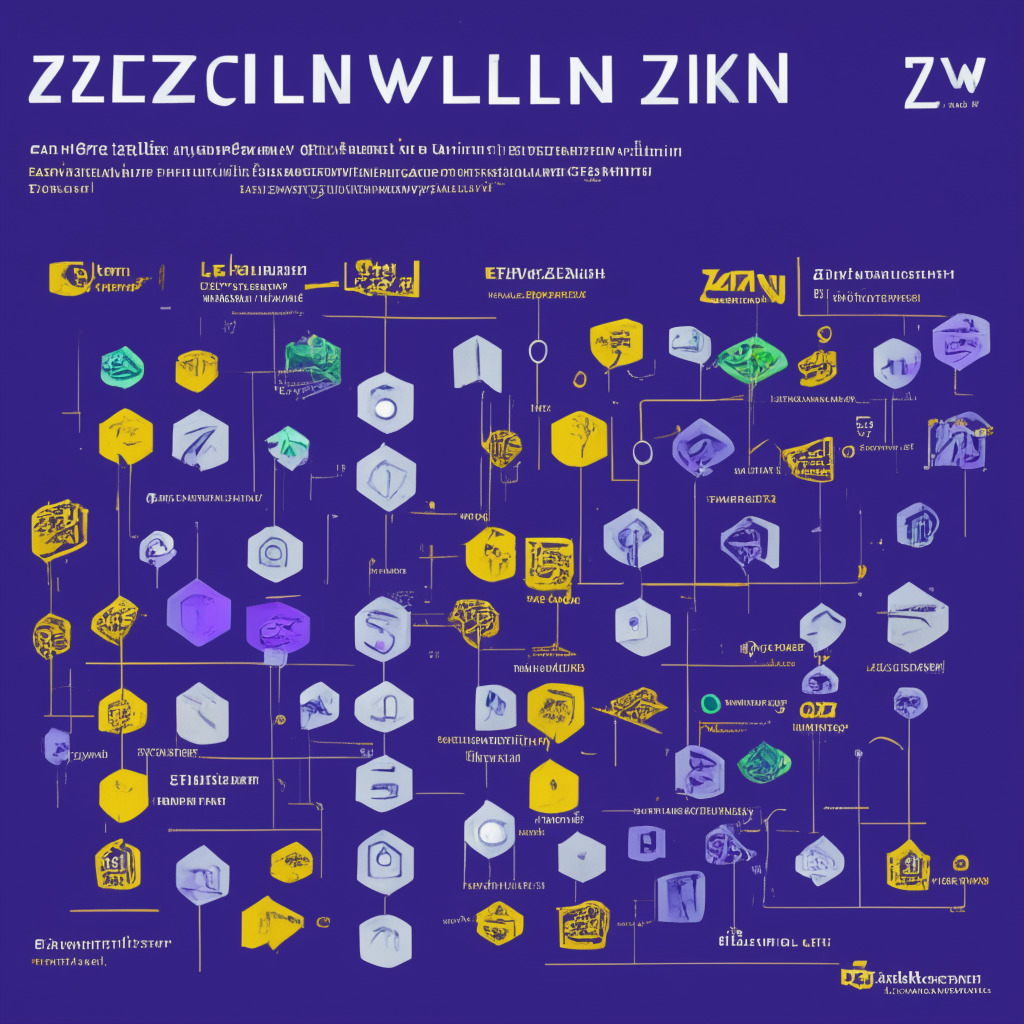Venture capital firm Andreessen Horowitz (a16z) is investing in the development of zero-knowledge (ZK) proofs and open-source software projects, Lasso and Jolt, aiming for scaling blockchains while preserving transaction privacy. These technological advancements may transform blockchain’s scalability and privacy, but could also introduce new vulnerabilities and challenges.
Search Results for: ZK proofs
Exploring ZK Proofs: Privacy Panacea or Another Layer of Web Complexity?
“ZK proofs, or zero-knowledge proofs, are cryptographic measures that could solve internet users’ privacy concerns. They secure data from the onset, only revealing essential aspects, potentially reshaping the internet framework. However, they may also add to the complexity of online security measures.”
Bolstering Blockchain: The Integration of ZK Proofs in Cryptographic Technologies
This article discusses the partnership between Paris-based =nil; Foundation and Fabric Cryptography as they work together to enhance cryptographic technologies and accelerate the deployment of zero-knowledge (ZK) proofs – a cryptographic procedure with substantial privacy-preserving attributes. They aim to overcome barriers in computation, making ZK proofs more functional for digital transactions, cloud services and privacy applications.
DeFi’s $39M Loss Fuels Rise of ZK-Proofs: A Game-Changer or Mask for Dark Exploits?
“The DeFi sector has been shaken by substantial losses due to cyberattacks, stirring interest in zero-knowledge-proof (ZK-proof) technology. This tech allows for encrypted, private transactions without revealing sensitive details, improving transaction speed and security. However, it may hinder industry transparency and has implementation challenges.”
Rapid Scaling of Ethereum: Harnessing the Power of ZK-Proofs and the Challenge of Off-chain Computations
“The Ethereum ecosystem is encouraging competition, with many firms developing Zero-Knowledge Scaling solutions. This technology enables secure off-chain computations and only light, non-data-revealing proofs on the Ethereum mainnet. Despite its efficiency, questions arise about the sustainability and security of off-chain transaction computations.”
Scaling Bitcoin With zk-Proofs: A Solution to Network Congestion and Transaction Fees?
The Bitcoin network faces congestion and increased transaction fees due to the demand for BRC-20 tokens. Zero-knowledge proofs (zk-proofs) may help address these issues by enhancing privacy, security, and blockchain capacity. Projects such as ZeroSync are exploring solutions like zkCoins to increase transaction throughput and improve network scalability.
Unveiling the Future: How Polygon’s $1 Billion Bet on ZK-Rollups Revolutionizes Blockchain Technology
Polygon co-founder Sandeep Nailwal believes strongly in the potential of zero-knowledge proof (ZK-proof) technology for Ethereum scaling, as evidenced by allocating $1 billion towards its development. Nailwal proposed a unified scalability system where recursive ZK-proof technology merges different blockchain ZK-proofs into a common layer, dramatically improving cross-chain transaction times.
Balancing Financial Regulation and On-Chain Privacy with Zero-Knowledge Proofs
Ethereum co-founder, Vitalik Buterin, proposes the use of zero-knowledge proofs (ZK-proofs) for ensuring financial compliance and privacy in the blockchain world. This method can verify claim affirmations without divulging all transaction details, thus balancing anonymity and accountability. However, acceptance and successful execution within the blockchain community and regulatory bodies will determine the viability of this potential revolution in blockchain technology.
Polygon’s Ambitious Leap: Is The Cryptoworld Ready for the ZK-Powered Value Layer?
Ethereum scaling firm Polygon has unveiled a toolkit for blockchain developers to create customized Layer 2 chains with zero-knowledge (ZK) proofs. This opens up potentials for evolving ‘Supernets’ using the firm’s ZK technology, aiming to build the “Value Layer of the internet”.
OP Stack Vs. ZK Rollups: Navigating the Future of Layer-2 Blockchain Technology
Major crypto enterprises like Coinbase, Binance, and a16z are setting up their own “layer-2” blockchain networks using OP Stack, despite the belief that promising layer-2 solutions will come from “ZK rollups” and not optimistic rollup technology. However, the choice of OP Stack may be due to its ease of setup. ZK rollups, while promising, require advanced hardware and high energy consumption.
Shifting the Gaming Landscape: Immutable zkEVM and the Unpredictable World of Crypto
Immutable’s zkEVM, a Ethereum-compatible gaming platform developed with Polygon Labs, has begun public testing. This platform uses zero-knowledge proofs to secure transfers, decreasing development costs and enhancing security. However, Ethereum founder Vitalik Buterin warns it may cause data inefficiency and latency issues.
Breaking Boundaries with Zero Knowledge Proofs: Andreessen Horowitz’s Lasso and Jolt Projects Unveiled
Andreessen Horowitz recently unveiled two innovative open-source projects, Lasso and Jolt, centered around zero-knowledge proofs – a robust form of cryptography. These initiatives aim to enhance transaction speed, cut costs, boost privacy, and empower external developers, introducing new opportunities to scale blockchain networks.
Unraveling the Mystery of Zero-Knowledge Proofs: A Double-Edged Sword in Crypto Privacy
“Zero-knowledge proofs (ZK-proofs), cryptographic protocols that authenticate transactions without disclosing specifics or user identities, play a significant role in improving the privacy and scalability of cryptocurrency transactions. However, aspects like verifying protocol, potential security flaws and facilitating illegal activity present challenges to their wide adoption.”
Merging AI and Zero Knowledge Proofs: Skyrocketing Blockchain’s Future or a Risky Endeavor?
“Blockchain technology combines with zero-knowledge proofs (ZK-proofs) and AI for improved smart contract solutions. Despite challenges, experts remain optimistic about its future. Integration of ZK-proof with AI hints at a transformative occurrence that continues shaping blockchain’s promising future.”
Harnessing the Future: zkSync’s Boojum and the Transformation of the Crypto-Landscape
zkSync Era’s latest launch, a STARK-based proof system called Boojum, aims to increase capacity while reducing fees in the Ethereum scaling protocols landscape. The system offers significant scalability and transparency improvements and promises superior processing capabilities. It seeks to make cryptosystems more accessible, potentially initiating a transformative shift in blockchain technology towards mass usability.
Exploring the Booming Use of ZK-Rollups and the Ongoing Shifts in the Crypto Domain
The increasing implementation of ‘Zero-knowledge rollups’ or ZK-rollups has remarkably grown in the Ethereum ecosystem. However, the DeFi domain needs better security optimization, with variegated results from bug bounty programs. Major breaches have been reported on the Multichain protocol despite bug detection strategies.
Polygon 2.0: zkEVM Validium Upgrade for Improved PoS Chain – Pros, Cons, and Conflict
Polygon Labs proposes upgrading its proof-of-stake (PoS) chain to a zkEVM validium to improve security and performance. The upgrade addresses issues like fast block times affecting gas estimation and chain reorgs while integrating zero-knowledge proofs into the infrastructure. Implementation is expected by Q1 2024 if accepted.
Teleporting Assets: Storage Proofs Revolutionize Cross-Chain Transfers and Security
Storage proofs, a cryptographic method aiming to revolutionize cross-chain asset transfers, may provide a more secure alternative to vulnerable bridges in the growing blockchain ecosystem. Starknet plans to be the first network to natively integrate storage proofs, potentially eliminating intermediary third-party “oracles,” offering enhanced security and user experience for asset transfers.
Polygon PoS Upgrade to zkEVM Validium: Security vs Scalability vs Decentralization Debate
Polygon co-founder Mihailo Bjelic proposes an upgrade to the Polygon PoS network, suggesting a shift to a “zkEVM validium” version for increased security through zero-knowledge proofs. This upgrade would enable Polygon zkEVM for high-value transactions, offering lower fees and enhanced security from Ethereum’s features, targeting applications like Web3 gaming and social media.
Exploring Polygon PoS Upgrade to zkEVM Validium: Scalability, Security, and Future Prospects
The Polygon Labs engineering team proposed an upgrade to Polygon Proof-of-Stake (PoS) sidechain, transitioning to ‘zkEVM Validium,’ an Ethereum-secured Layer 2 network secured by zero-knowledge proofs. Targeted for Q1 2024, this upgrade aligns with Polygon 2.0’s vision and aims to enhance scalability, security, and interoperability within the broader cryptocurrency ecosystem.
Unlocking Blockchain’s Potential: Zero-Knowledge Proofs, Privacy, and Regulatory Challenges
Blockchain needs its SSL equivalent to become genuinely useful. Zero-knowledge cryptography may unlock blockchain’s full potential in a secure and compliant manner while preserving user privacy. However, achieving the right balance between privacy and transparency is crucial for mainstream adoption.
Ethereum’s Polygon zkEVM Soars: Analyzing Record Growth and Potential Pitfalls
Ethereum’s high-performance scaling solution, Polygon zkEVM, has witnessed significant success with a new all-time high in transaction volume and a 70% increase in Total Value Locked. Polygon zkEVM offers enhanced privacy, security, low transaction fees, and quick confirmation times, making it highly attractive for financial applications.
ZkLink’s $10M Funding Paves Way for Cross-Chain Trading Revolution: Coinbase Backs the Project
ZkLink, a blockchain infrastructure layer streamlining asset trading across networks, raises $10 million in strategic funding with backing from Coinbase Ventures. As zkLink prepares for Q3 mainnet launch, it plans to employ zero-knowledge rollups to create efficient, trustless trading experiences, aiming to connect layer 1 blockchains and layer 2 protocols.
Exploring zkLink’s Dunkirk Test: A New DeFi Safety Benchmark or Just a Marketing Stunt?
zkLink is introducing the “Dunkirk Test”, a DeFi safety benchmark, to encourage higher security standards for user funds in the crypto industry. Users can experience zkLink’s emergency asset recovery feature during the 72-hour server shutdown event and earn rewards for participating.
Wirex’s W-Pay: Future DeFi Gamechanger or Just Another Crypto Wild Card?
Wirex’s new service, W-Pay, introduces a non-custodial crypto debit card service leveraging Zero-Knowledge (ZK) proofs-based technology. This service offers a new way of interacting with cryptocurrencies daily, promising swift, secure transactions, and sole control over funds. However, ongoing challenges with partnership dependencies may pose questions about the technology’s reliability.
A Look into the Future: AI and Blockchain Synergies at EthCC Paris Conference
The Ethereum-focused conference EthCC witnessed buzz due to potential shift in the crypto market and the confluence of AI with blockchain technology. Future prospects of AI in crypto financial markets and valuating non-fungible tokens were discussed. Skepticism around use-cases and computational demands of AI and blockchain intersection remain.
RISC Zero Bags $40 Million for its Bonsai Computing Platform: A Step to Decentralized Security
RISC Zero, known for zero-proof software solutions, raised $40 million in a Series A funding led by Blockchain Capital to boost its innovative Bonsai computing platform. The platform aids developers with incorporating zero-knowledge proofs to enhance application security and complex computations.
Bpifrance Dives into Crypto: Boosting French Blockchain Innovation Amid Risks
Bpifrance, a French publicly funded investment bank, enters the crypto space by investing in hardware wallet manufacturer Ledger, exploring Web3 opportunities like Zero-Knowledge (ZK) proofs. The bank aims to support the growing French crypto and blockchain ecosystem, targeting over 450 startups and promoting French innovation in the global blockchain sphere.
The Future of Crypto Mixers: Balancing Privacy and Regulation in Blockchain Transactions
Crypto mixing services like Tornado Cash, once thought to be at risk due to sanctions, are making a comeback with legitimate use cases for traders and funds. Developers are experimenting with redesigned mixers using ZK-proofs, which can balance individual privacy with revealing limited data to banks or government agencies. Demand and regulation will shape the evolution of these privacy mixers.
DeFi Evolution: Opportunities, Challenges, and Navigating Compliance in 2022
Decentralized Finance (DeFi) has gained momentum in the face of centralized finance (CeFi) mishaps in […]
Zero-Knowledge Tech Fueled W-Pay: A Revolution in Secure Crypto Transactions
“Wirex, a global digital payment platform, introduces W-Pay, an App Chain powered by Zero-Knowledge technology. Aimed at enhancing connections between DApps, non-custodial wallets, and traditional payment systems, it offers swift, secure transactions and total fund control. The Ethereum Virtual Machine compatibility ensures diverse functionalities and promotes crypto ecosystem interoperability.”
Buenos Aires Paves the Way: Integrating Blockchain into City Administration
“Buenos Aires is integrating blockchain technology into its administrative functioning. Residents can access identity documents via a digital wallet from October. This decentralization improves security, although questions arise about privacy and the digital divide. Diego Fernandez views this as a public good, setting a benchmark for using blockchain technology for citizen benefits.”































